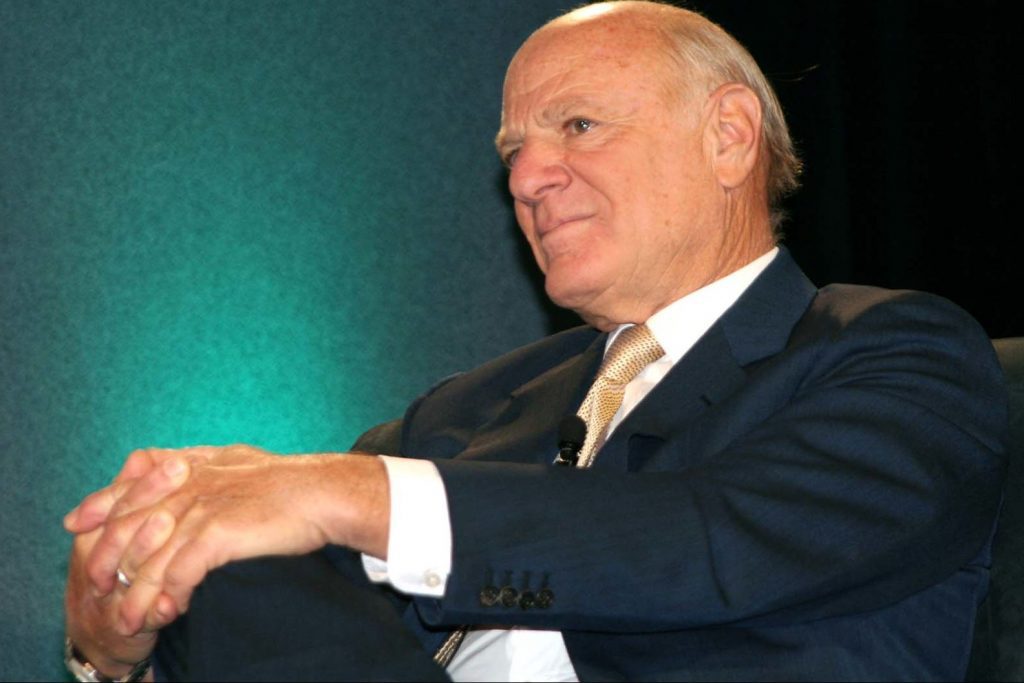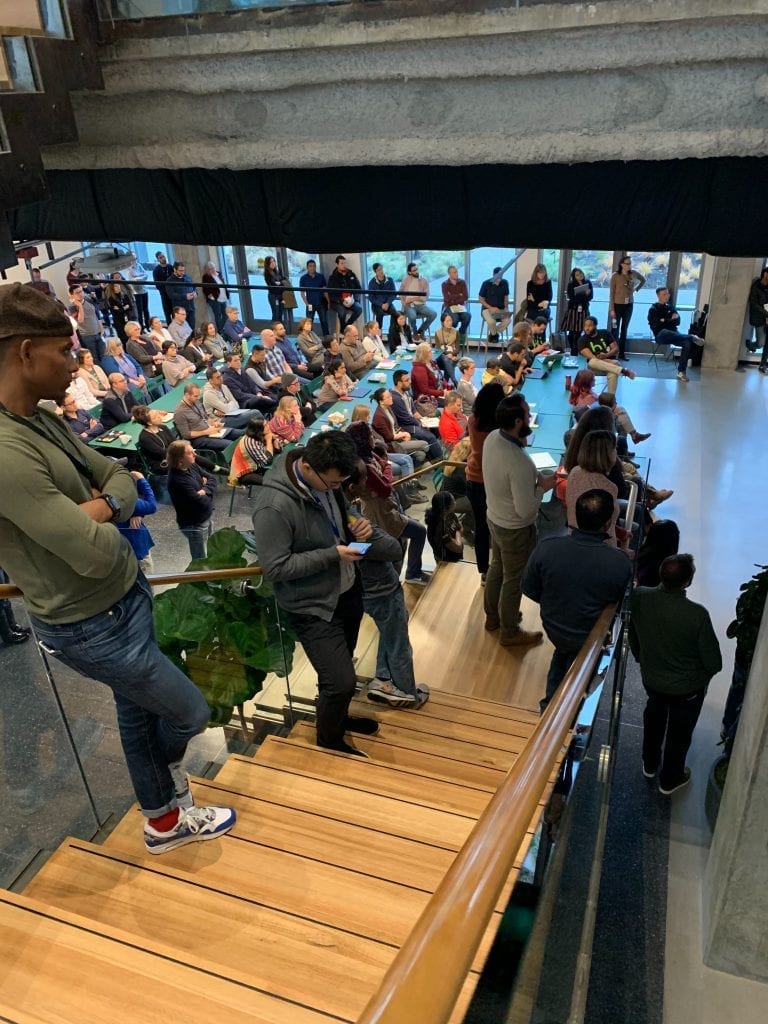What Barry Diller Told Anxious Expedia Workers About the Future

Skift Take
No, you're not going to see Barry Diller sweat.
In an all-hands-on-deck employee meeting Thursday, Expedia Group Chairman and senior executive Barry Diller reassured the troops that the future is bright, and that he's not in any kind of panic mode following the abrupt departures of CEO Mark Okerstrom and Chief Financial Officer Alan Pickerill earlier this month, Skift has learned.
Diller, along with vice chairman Peter Kern were interviewed in a fireside chat by Ariane Gorin, president of Expedia Business Services.
Diller told those in attendance at headquarters in several "watch parties" and many others listening remotely that he and vice chairman Kern will take a deliberative approach in assessing the company’s needs before appointing a new CEO and chief financial officer, according to a senior leader with knowledge of the meeting. The gathering was closed to the press. Expedia had 24,500 employees at the end of 2018.
Diller and Kern are running Expedia following the exits of Okerstrom and Pickerill.
According to a second source, Diller and Kern said the CEO and CFO search is not yet formally under way. They plan on taking time digging into the business, and have no desire to merely fill a couple of open positions.
The two executives said they have no plans to undo Okerstrom's controversial reorganization, and they support the former CEO's "platform path," which sought to combine teams from various of the company's brands where it makes sense.
The employee meeting at Expedia's new headquarters took place on a rainy Thursday morning as employees gathered at food trucks in front of the still-under-construction headquarters before and after the meeting. They snuck cigarette breaks just outside the campus; a few streamed over a pedestrian bridge after the Diller briefing to grab some lunch.
In the fireside chat with Diller and Kern, there was no sense that Diller was feeling pressure about the company’s current situation or the path forward, the senior leader said. Investors, however, have undoubtably been making their feelings known.

Expedia employees gathered on Thursday for the fireside chat at corporate headquarters with Chairman Barry Diller and Vice Chairman Peter Kern. Credit: Expedia Group.
The session at the headquarters on the shores of Elliott Bay may have been the first time that the entire employee base had a chance to see an in-depth discussion with Diller.
Promises Versus Reality
The hope among some employees seemingly is that Expedia under new leadership will back up its promises by really delivering on customer-centricity.
“We have some basics to get right in addition to some of the great things we demo at conferences,” the senior leader said.
Several months after Okerstrom took over the Expedia C-suite from predecessor Dara Khosrowshahi in late August 2017, Okerstrom articulated a new strategy that included making Expedia more locally relevant. In addition, he advocated putting the “agent” back in online travel agency, but the source acknowledged the company has a way to go before that is achieved.
The sources wouldn’t comment on whether Diller mentioned any restructuring in the future, or whether any layoffs could be in the offing.
Expedia Group’s reorganization, Okerstrom admitted during the company's third quarter earnings call, was very distracting to the company’s operations. Expedia then lowered guidance for full-year 2019. Expedia's net income fell 22 percent in third quarter year over year to $409 million.
Skift also spoke with a handful of employees outside Expedia's headquarters about morale at the company, and the employee meeting. One said his team is optimistic about 2020, as Diller has expressed confidence that it will be a growth year for the company.
Others say, however, that the reorganization that's been under way for the past six months took a toll on employee morale.
None of the employees offered details about the employee meeting; one said Diller didn't really divulge anything in the meeting that he hadn't already stated publicly.
Two sources said that there was an executive call Thursday morning before Diller's fireside chat with employees that may have been more detailed about strategy. One source said it revolved around prioritizing what adds value to the Group and saying no to things that don't.
The Cost Question and investor dismay
Some observers believe substantial layoffs are in the offing, perhaps in January. And while Diller and Kern may take a deliberative approach to bringing on a new CEO, it remains to be seen if investors are patient, as well.
A measure of investor dissatisfaction could be seen at Expedia'S annual shareholder meeting December 3. The company announced the departures of Okerstrom and Pickerill the next day.
Leading up to 2019's Expedia Group annual shareholder meeting, Institutional Shareholder Services, the corporate governance group, recommended that shareholders withhold votes for board chairman Barry Diller, and directors Victor Kaufman, Peter Kern, Dara Khosrowshahi, Mark Okerstrom, and Alex von Furstenberg.
Perhaps an indicator of shareholder discontent with Expedia's financial performance and corporate governance issues, Kaufman saw more than 110.7 million votes withheld for his reelection to the board versus about 61.6 million in favor; Khosrowshahi likewise saw more votes withheld than those in favor, 92.1 million withheld versus 80.1 million votes cast in favor of his reelection.
Diller, Kern, and von Furstenberg, who's the son of Diller's wife Diane von Furstenberg, each also attracted a large number of withheld votes, all at least in the 62 million range versus some 108 to 110 million in favor.
Leading up to the meeting, the corporate governance group noted that Kaufman, a longtime Expedia board member who's also vice chairman of Diller's IAC, attended less than 75 percent of Expedia's combined board and committee meetings. The group also pointed out that the board didn't have a majority of independent directors, and that Khosrowshahi, as a non-independent member, still holds a seat on a key panel, the nominating committee.
For those investors who argue that Expedia Group is ripe for cost-cutting, a GuruFocus article published on Yahoo Finance reported that the differential in personnel costs at Expedia Group versus Booking Holdings is "staggering." In 2018, Expedia's personnel costs as a percentage of revenue was 29.3 percent versus 14.1 percent at leaner rival Booking Holdings, according to the article.
Booking Holdings likewise generates much more profit than Expedia.
How the new CEO and chief financial officer would address these issues — and whether a wide-ranging private equity-like restructuring takes place, perhaps under Kern's leadership — will be agenda item number one for the new team on the executives are hired.






